This one, the first Herb had created since his marriage to Lorna, represented something quite new. It set a style that would define the course of development for animated coarse goods for nearly two decades. Inside a silver case, very much like the case of a pocket watch, a tiny couple was couched. Slowly, very slowly, Ben twisted the stem and observed the couple’s performance. What the couple did as Ben turned the stem was affectionate, inventive, clever, difficult, and surprising. Herb had spent countless hours developing the routine, doodling on scraps of paper, constructing mechanisms in his imagination, building tiny frameworks of wire and bewildering assemblies of gears and shafts and pulleys and belts in moments stolen from work at the clam-packing plant.
Ben looked up from his examination of the couple in the watchcase and grinned. “This is very—um—creative, Herb,” he said. “Very creative.” He glanced at Herb and then turned his attention back to the couple. “I wonder where you get your ideas.”
Herb colored, and he chuckled to try to hide his embarrassment. Ideas came to him from his imagination, from his dreams and daydreams, from that never-ending lust that a man feels for the girls of his youth, and from observations of women around Babbington. He might notice in a woman a certain way of walking, say a certain swing of the hips, and see it as a manifestation of the woman’s peculiar style, just as one might recognize in the use of a certain blue or a certain recognizable brush stroke a manifestation of a painter’s style, or recognize in the frequent use of a certain grammatical technique a certain manner of thought that underlies a writer’s style. While Herb observed the woman’s walk, he made some inferences about her style, and he asked himself some interesting questions: How would that style show up in the woman’s lovemaking? How would it affect her movements in bed? Such pleasant speculations occupied Herb for many hours every day; they were the salacious equivalent of the kind of speculation that helped make him such a superb salesman: I know certain things about this person. From them, what can I decide about his attitudes, his desires? What can I predict about his resistance to my selling?
“You must be enjoying married life,” Ben said, without looking at Herb.
Herb looked at his hands and said nothing. He was enjoying married life, and he was enjoying sex with Lorna, but something was missing. He was a restrained lover in the big pine bed in the room behind the Mikszaths’, less imaginative, less daring, than he was in his gear-and-pulley work. When Herb was at work on his coupling mechanisms, he couldn’t help wondering whether some of the techniques and alignments he developed were entirely original, whether he had invented anything that had never had an in-the-flesh trial in all the history of mankind. Sometimes he wondered whether some of his inventions were humanly possible. Always he wondered how they would feel. Many struck him as too far removed from the simple and obvious ever to be widely accepted, and many struck him as unacceptable for home use. And sometimes he was afraid that, because these were the products of his imagination and his desires, they might be things that only he could enjoy, things he ought to be ashamed of, and this feeling applied not only to the things that might have been too bold but to those that might have been too sentimental or too silly.
“Dut, dut, dut,” Herb said, as a way of avoiding having to explain to Ben any part of all that he thought and felt.
“What?” asked Ben.
“Oh, nothing,” said Herb. “It’s just something our landlord says. What do you think you can give me for this couple, Uncle Ben? I want to get Lorna a coat for her birthday.”
A MONTH OR TWO LATER, while on a visit to Chacallit, Lorna accepted
Luther’s invitation to visit the mill one morning to “say hello to the
girls in Links,” and to see “some of the new products we’re going to be
making in ivory.” She knew what he must have in mind, and she was
curious to see what the unknown designer of animated coarse goods had been
up to lately.
“Lorna,” said Luther, holding the prototype enclosed
in his hand, “what I’m going to show you is a work of genius. I want
you to appreciate that, and I want you to consider very carefully whether
you shouldn’t be adding your talent to it.” He put the case in Lorna’s
hands, pressed them together around it, gave them a squeeze, and said,
in a hushed and reverent voice, “I’m going to leave you to contemplate
it on your own.” He left the office, and Lorna, bursting with curiosity,
opened the lid.
She watched the couple for a long time. She
found, while she watched, that she began wishing that she could show them
to Herb. She wished that what they were doing could be put to trial
in the big pine bed. She sighed and closed the lid. It wasn’t
likely. She was a restrained lover, restrained by the fear that she
might give herself away, by being ashamed of the work she did, and by the
generations-old Huber conviction that it was safest not to appear extraordinary.
Now and then she dared to surprise Herb with something, but only something
small. She was usually careful, very careful.
“HERB,” she whispered that night, when they had retired to her old room
in her parents’ house, “I think I’d like to do a little work for my Uncle
Luther now and then.”
“What do you mean?” asked Herb.
“Well,” she said, beginning an explanation that
she had practiced during her walk up Ackerman Hill from the mill, “when
I saw the work that he’s getting from the people he has carving for him,
I realized something. This is going to sound very immodest, but I
have to say it. I realized that I was the best carver Chacallit has
ever seen. Everyone who was working there in the carving section
knew it.”
“Uh-huh,” said Herb.
“And you know what else I realized?” she asked,
rolling onto her side and bringing her lips close to Herb’s ear.
“What?” he asked.
“I realized how much I liked the work. I really
liked doing something that I could do so well. It made me feel—it
made me feel—” She stopped, unable to say what she had felt.
“I know,” said Herb. He turned to face her.
“I know what you mean. It made you feel—better—better than anybody
else.”
“That’s right!” whispered Lorna.
“It’s hard to admit, but it’s nice, a nice feeling,
to feel that you’re the best at something.”
“Yes,” said Lorna. “Yes it is.”
“But how could you manage to work for your uncle?
You don’t want to move back here, do you?”
In a rush, Lorna explained the plan. She would
do everything by mail. From time to time, Luther would ship her some
materials and a list of the subjects she was to carve—tiny roses, leaves,
animals, and the like. She would set herself up with a place to work.
She wouldn’t need nearly as much space as she would need for, say, a sewing
machine. She would work during the day, while Herb was at work.
She wouldn’t work too much—he didn’t have to worry about that, and no one
would even know that she was working. He didn’t have to worry that
it would look as if he couldn’t support her. Now and then she would
get a package from Chacallit—nothing unusual about that. And now
and then she’d send a package to Chacallit—nothing unusual about that,
either! “Oh, Herb,” she said, “you wouldn’t mind, would you?”
“Will you promise me one thing?” he asked.
“What?”
“I want you to spend the money on yourself.”
“I—”
“Promise?”
“Promise.”
She nuzzled him and, silently because they were
in her parents’ house, pressed herself against him. She remembered
the little couple she had seen that afternoon. Do I dare?
she wondered.
Herb drew a deep breath, slowly. He thought
about the routine he had devised for the little couple. Should
I try? he wondered.
It’s really just a matter of arranging myself
in a slightly different way, she told herself.
It’s a delicate matter, he reminded himself.
It
can’t seem like something I’ve thought out or—even worse—something that
I’ve done before.
I can’t let him think that it’s something I learned
from someone else. It has to be just a little touch here, a little turn
this way, like that—
It has to be just sort of like going for a stroll,
when you’re enjoying the walk and not paying too much attention to where
you’re going and then you look up and find you’re in a part of town where
you’ve never been before.
Oh, my, she thought. I would never
have thought it would be so easy. Or so, so—
She doesn’t seem startled or—upset. It’s—
—wonderful.
—wonderful.
They astonished each other. Lying in the dark,
later, when each thought the other had fallen asleep, Herb asked himself
the question Lorna had feared: Where on earth did she get those ideas?
He couldn’t help wondering whether Lorna had had more experience than that
provided by Andy Proctor, the hero of Chacallit. He knew about the
back-seat session with Andy because Lorna had told him one evening, the
same evening when he told her about Alice Mills. It had been one
of those “damned confessional evenings that lovers insist on torturing
themselves with,” according to May:
Gad! Why do they do it? I mean—why don’t they have the sense to keep quiet about things that they ought to keep quiet about? Well—it was an evening when they went rowing on the bay in the moonlight. A favorite thing of theirs to do, of course, since it reminded them of the night the ballroom burned. But of course it reminded Lorna of that night in a rowboat with Luther too. So! She was of two minds on such occasions, as you can well imagine. Oh, anyway, Herb kicked things off. Why is it that men need to confess things? Clear the air! Get things out in the open! Lay my cards on the table! Get this off my chest! Brrrr! I get chills when I hear words like that. “May, I want to get something out in the open.” No thank you! Good night! Perhaps it’s just boasting, do you think? Well. Anyway, Herb told her about Whatever-her-name-was, that girl who fell in love with him while he was in France—Alice Mills. And then he told her about that strange couple—the ones he met at that gas station—you remember them. Oh, you know. Herb assumed the woman was Whoosis’s daughter, but she turned out to be his wife? Arthur and Tessie Norris. Well, Herb told Lorna all that. Lorna told Herb that he didn’t have to go into all of this for her sake, but he insisted. He said—and he honestly believed what he was saying—that he hoped that as the years went by Lorna would learn everything about him there was to know, since he thought it was important for a married couple not to hide anything from each other. Oooh. A ghastly idea. Ghastly. Well, Lorna—poor thing—felt she had to give something in return for all this honesty, so she gave him Andy. So to speak. Now what do you suppose happened? I’ll tell you what I suppose. What always happens. They both wound up thinking, Well, there must be more. Nobody would confess everything, so there must be more. Honesty is very dangerous.As time passed, Herb and Lorna began, little by little, to invite imagination into the big pine bed. Though Herb wondered about the sources of Lorna’s inspired lovemaking, he never recognized what should have been obvious, that some of the ideas had been his. Nor did he recognize Lorna’s inventiveness. Jealousy made him suppose that her ideas must come from other experiences.
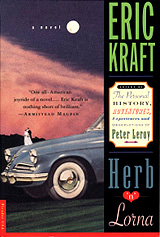
YOU CAN READ
THE FIRST HALF OF THE BOOK
HERE,
ONLINE, ONSCREEN,
OR
YOU CAN ORDER THE
PICADOR USA EDITION
AT
OR
BARNES&NOBLE.COM.
YOU CAN DOWNLOAD
THE COMPLETE TEXT
AS AN eBOOK
AND
READ IT IN BED.
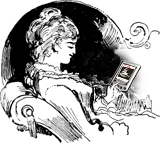
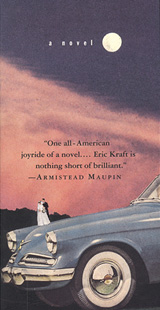
It would have been impossible for Herb to find time or a place to work on his designs if it hadn’t been for his meeting Garth Castle. Garth was at the time a young man to watch at Babbington Clam. He was tall, wiry, and handsome, and though he was only three years older than Herb, he had about him an air of worldly sophistication that made him seem much older. This air was only an air—Garth had been born in Hargrove, the next town, and had never traveled farther from Hargrove than New Jersey. To give himself the air, he drew on his imagination and his careful observation of men who seemed to him to be truly worldly and sophisticated. Some actually were; others were merely successful at business, and that only on a local scale.
Garth wanted to be, in Babbington, a New York gentleman, or what he took to be a New York gentleman. He behaved as he supposed one would if he were, for reasons unknown but probably just a little bit scandalous, rusticating in Babbington. He succeeded admirably. Success in this pretense brought Garth confidence and a relaxed style, and in time he appeared so at ease in the role he’d written for himself that he seemed to many Babbingtonians to be a man making the best of having been banished to Babbington, a man who’d risen above being resigned to his lot and was now—and with what grace!—actually enjoying it. He was a model for every ambitious young man in town.
Herb attracted Garth’s attention by designing a new culling table. Formerly, the culling table had been nothing more than a large wooden table, about waist height, covered with a sheet of zinc, placed in front of an opening in the bin into which the clams were dumped like so many lumps of coal. Cullers stood alongside the table, and one of them, the “doorman,” slid a small wooden door upward, releasing clams from the bin. When the table was covered with clams, the doorman, with great difficulty, slid the door down again, and the cullers began work. Each sorted the clams that came immediately to hand, tossing them according to size, without looking backward, into crates arranged along the walls behind the cullers. This method had many faults: the doorman’s job was difficult and frustrating; the cullers often interfered with one another, straying across poorly defined boundaries in their zeal to cull; and, though the cullers were (after much training and practice) very good at getting the clams into the crates without looking, and even knew from the sound of the clams clattering against their crated fellows how nearly full a crate was, clams often collided in midair and ricocheted into the wrong crates, and the concussion of one clam against another, in the air or in the crate, occasionally cracked or crushed them.
Herb was intrigued by the problems the table presented. He began lingering in the carpentry shed after work to put in some time on an idea he had for an entirely new kind of culling table. He worked alongside one of the carpenters, Andrew “Swifty” Switt, to build it. When it was finished, he and Switt installed it one night in place of the old table.
Herb’s table was much longer than the old one. At the head, in place of the sliding door, was a cylinder with an opening in one side of approximately the same dimensions as the opening behind the old door. A crank allowed the doorman to turn this cylinder. As the opening rotated past the opening to the clam bin, the cylinder filled with clams, and, as the opening rotated over the table, the clams tumbled from the cylinder onto the table. The doorman could vary the rate of rotation to suit the pace of the cullers. The table was slanted so that the clams would be inclined to slide toward the far end. Herb and Swifty had carved the surface to create a system of valleys, through which the clams could be urged, by the cullers, to go. From the largest valley, at the head of the table, the clams might, with the assistance of the first group of cullers, pass into either of two smaller valleys, and then, from each of those, with the assistance of the next rank of cullers, into either of two still smaller valleys. The cullers used this system of branching valleys to sort the clams into their four sizes: undersize (that is, too small to sell legally), littleneck, cherrystone, and chowder clam. The system had the great virtue of allowing the use of apprentice cullers at the head of the line, since they merely had to distinguish the relatively smaller clams from the relatively larger clams. The more seasoned cullers who were stationed farther along made the subtler distinctions, and they did it with little wasted motion, merely nudging the clams a little to guide each into the proper valley. Toward the end, the table fanned out, and the valleys diverged, each ending above a crate, into which the clams tumbled fairly gently.
When Garth Castle saw the new table in operation, he was astonished as much by the fact that Herb had undertaken its design and construction for pleasure as he was by the results. Here was someone out of the ordinary. He was impressed, too, by the ease with which Herb had gotten Swifty to build the table, working after hours, and by the cooperation he got from the cullers, who were generally considered to be a hidebound lot, resistant to change, second only to the clammies themselves in stubbornness. Here was a leader. Garth offered Herb the foremanship of the culling section. Herb asked instead that Garth arrange for him to move into sales. And, as if it were an afterthought, he asked that Garth set aside for his exclusive use the area of the workshop where he had developed the culling table, so that he could tinker. It was there, in an hour or two after work, any afternoon when he could spare the time, that Herb developed the prototypes of the Watchcase Wonders.
Herb’s moving into sales had a painful consequence, though: he had to be away from Babbington, and Lorna, for days (and sometimes for weeks) at a time. As soon as he had experienced the first of these separations, he began racking his brain for a way to get out of traveling. He had wanted the job for only one reason: to earn himself a reputation. He had imagined that a year or so traveling for Babbington Clam wouldn’t be so bad, but he’d found instead that to be without Lorna was to be in an almost constant state of need. When he was away he seemed to lack everything. No matter what he ate or how much he ate, he was hungry; when he woke in the night and his mouth was dry, the water he drank didn’t quench his thirst any more than do those glasses of water we drink in our dreams; boredom and loneliness sent him to bed early, but he never seemed to get enough sleep; and, without Lorna, he sometimes felt cold, especially at the tips of his fingers and across his shoulders, even in the warmest weather.
“How, how?” he asked himself, again and again, when he lay awake on lonely nights in half-empty beds in faraway places. How could he get out of this misery he’d brought himself? He couldn’t quit so soon; he’d appear unreliable, disloyal, fickle. He couldn’t use the truth as a reason. Love and loneliness weren’t suitable reasons for a man to abandon a job that was a step up, especially not when he was performing so brilliantly that he’d attracted the attention of everyone who had the power to improve his future.
Garth provided the solution. One day, when Herb was between trips, Garth asked him to meet him after work. They drove to the rattiest section of the ratty wharf area of Babbington.
In Seafood and Sex, his study of life in “a small coastal town somewhere in America,” T. Wallaston (Stretch) Mitgang, the pioneering psychohistoricosociologist, wrote:
The waterfront area—that is, the area near the working waterfront, the poorest area of town, the messiest, the rattiest—is its true social frontier, a miniature of the social frontier of American society at large. Here are tiny clusters of representatives of ethnic and racial groups who haven’t yet made their way downtown (or haven’t been permitted to) and who may never make their way (or be permitted to make their way) to one of the shady streets of comfortable houses along the pleasant canals away from the sound and smell of men and women at work, unless it is to make a delivery, mow a lawn, or wash a floor. To spend time in this part of town, with its diversity of colors, tongues, religions, pasts, plans, and dreams, is to see that the melting pot, with its suggestion of a homogenized mush, is the wrong metaphor. Better would be something like a stewpot. If we are concocting an American social dish, this is where it’s cooking, and it’s something like a hearty stew or chowder, with chewy bits in every spoonful, not all of them familiar.Garth took Herb to a place that Herb had heard of but never visited before: Corinne’s. There were two parts to Corinne’s. In plain sight, almost at the end of Lower (that’s Lower Bolotomy Road, remember), was a fish house with the name Corinne’s on a painted sign that ran along the ridge of the roof, and behind the fish house, concealed in a warehouse, was the other Corinne’s, the one sometimes referred to in speech as Corinne’s Warehouse, a name delivered with a wink, a raised eyebrow, and a sly elongation of the first syllable of the second word. This was the speakeasy and whorehouse.
When they entered the warehouse, Herb found himself in a chaos of crates and boxes and pallets and skids and barrels. Garth followed what seemed to be a familiar pathway through this chaos, and Herb tagged along. Suddenly, for no apparent reason, Garth stopped and stood perfectly still for a moment, listening. Satisfied that there were no following footsteps, he pushed the side of a large crate, and it swung inward. Garth motioned Herb into the cabinet he had revealed, and then followed Herb inside and pulled the door closed behind them. From his pocket he took a small silver penknife engraved with his initials, and he pushed it through a knothole on the opposite side of the crate. In a moment, that side of the crate swung open, and a small, bent old man in a brown suit welcomed Garth and Herb. As they passed him, Garth held out his hand, and the old man dropped Garth’s penknife into it.
Herb tried very hard not to notice who else was in the place. He understood that Garth’s gesture in bringing him here was a statement of trust, and he wanted to show that it wasn’t misplaced.
“Herb,” said Garth, “I’m going to tell you something that you have to keep under your hat.”
Herb nodded, just once.
“Good,” said Garth. “I’ll come right to the point. I’m going to leave the company, and I want you to come with me. Some important people—I can’t say who just yet—have gotten together to buy a Studebaker distributorship, and they want me to manage it. Herb, how would you like to sell Studebakers?”
“Here in Babbington?” asked Herb.
“Well, yes,” said Garth. “I know it might seem a little—well—boring to be in Babbington all the time, but you could really build a future here, Herb, and—”
Herb raised his glass and nodded, and Garth smiled.
“Good,” he said. “Good.”
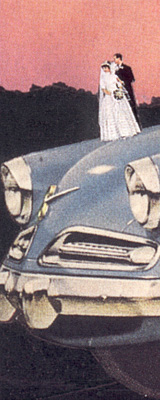
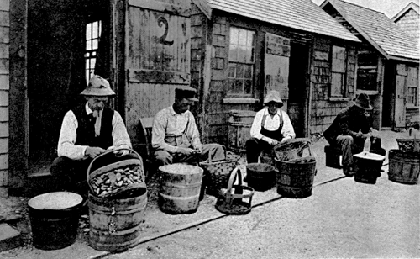
Clam shuckers at work in front of Shucking Shed Two at Babbington Clam,
about 1925. Herb (out of sight in shed at extreme right) is at work constructing
the new culling table.
